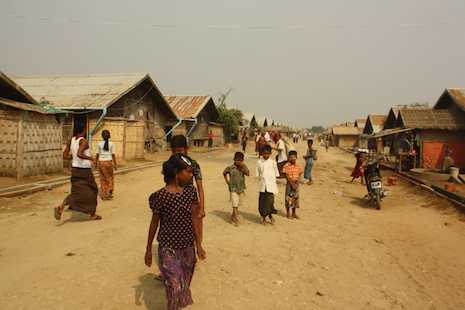
Rohingya Muslims are seen in a camp for displaced people near Sittwe, Rakhine state, in March. (Photo by John Zaw)
Fifteen Rohingya candidates have been barred from running in Myanmar's upcoming elections, adding to fears it is part of the mass disenfranchisement of a long-embattled ethnic minority group ahead of key Nov 8. polls.
The country's election commission ruled Aug. 29 that the 15 parliamentary hopefuls from the Democracy and Human Rights Party, which is predominantly Rohingya, were ineligible to run because their parents were not citizens when they were born.
"The decision does not make sense and it lacks a detailed explanation," Kyaw Min, the party's chairman and one of the 15 disqualified candidates, told ucanews.com in an Aug. 31 interview.
The move comes despite the fact that Kyaw Min, a former school teacher, secured a seat during Myanmar's 1990 election, which was won by opposition leader Aung San Suu Kyi's National League for Democracy party before the military junta refused to recognize the results.
Kyaw Min said his party planned on contesting the election commission ruling, but said he feared it was part of an attempt "to target the specific Rohingya community," ensuring the Muslim minority group would not play a significant role in the Nov. 8 election.
The ruling comes after Shwe Maung, a prominent Rohingya member of parliament with the ruling Union Solidarity and Development Party, was recently barred from running in the election because his parents were not Myanmar citizens when he was born. Nevertheless, Shwe Maung's father was a career policeman and Shwe Maung himself ran and won a seat in Rakhine's Buthidaung constituency in 2010.
Pending the result of the planned appeal, the commission's ruling leaves the Democracy and Human Rights Party with only three remaining candidates out of the 18 it had put forward to run in Yangon, the country's largest city, and Rakhine state.

An ethnic Rohingya Muslim child looks at boats at a refugee camp outside the city of Sittwe in Myanmar's Rakhine state in May. Election officials recently declared 15 Rohingya candidates would be barred from running in November elections. (Photo by Ye Aung Thu/AFP)
'They can't vote'
Rights groups have long warned of a mass disenfranchisement of persecuted Rohingya Muslims ahead of the election, which is seen by many observers as a test of the country's quasi-civilian government's democratic reforms.
Earlier this year, the government effectively disenfranchised about 700,000 people, mostly Rohingya, when it declared holders of “white cards” ineligible to vote. The cards had been issued as temporary identification documents, and white-card holders had been permitted to vote in the 2010 election.
During that election, the quasi-civilian government led by President Thein Sein did particularly well in areas with many white-card holders, including Buthidaung and Maungdaw townships. This year, however, Buddhist-led groups protested against the policy and Thein Sein announced that white-card holders would not be allowed to vote.
Likely to benefit from such moves are candidates supported by ethnic Rakhine Buddhists, who have long-standing enmity toward the Rohingya and a distrust of the national government.
The Arakan National Party comprises predominantly ethnic Rakhine Buddhists and is expected to win a majority of the state's allotted seats in parliament. Khine Pyi Soe, the party's vice president, said his party has urged its candidates to file an official complaint if non-citizens attempt to contest the election.
"For those who are eligible for citizenship under the 1982 citizenship law, they can vote in elections but for those who aren't eligible, they can't vote," he said in an interview.
The government and the Buddhist Rakhine community do not recognize Rohingya as one of the country's official ethnic groups, and instead require them to identify as "Bengali" because they are often viewed as illegal immigrants from neighboring Bangladesh. Under the 1982 citizenship law, any path to citizenship would require identifying as Bengali.
In August, Yanghee Lee, the U.N. special rapporteur for human rights, expressed "grave concern" about the disenfranchisement of hundreds of thousands of potential voters.
"More must and can be done to address the legal status of the Rohingya and the institutionalized discrimination faced by this community," she said in a statement.


